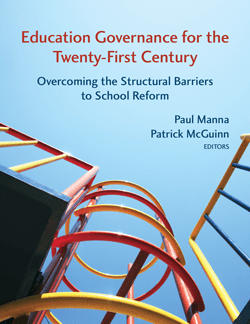America’s fragmented, decentralized, politicized, and bureaucratic system of education governance is a major impediment to school reform. In Education Governance for the Twenty-First Century: Overcoming the Structural Barriers to School Reform, a number of leading education scholars, analysts, and practitioners show that understanding the impact of specific policy changes in areas such as standards, testing, teachers, or school choice requires careful analysis of the broader governing arrangements that influence their content, implementation, and impact.
Education Governance for the Twenty-First Century comprehensively assesses the strengths and weaknesses of what remains of the old in education governance, scrutinizes how traditional governance forms are changing, and suggests how governing arrangements might be further altered to produce better educational outcomes for children.
Paul Manna, Patrick McGuinn, and their colleagues provide the analysis and alternatives that will inform attempts to adapt nineteenth and twentieth century governance structures to the new demands and opportunities of today.
* Copublished with the Brookings Institution and the Center for American Progress

